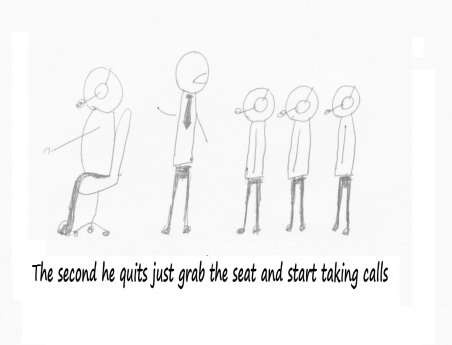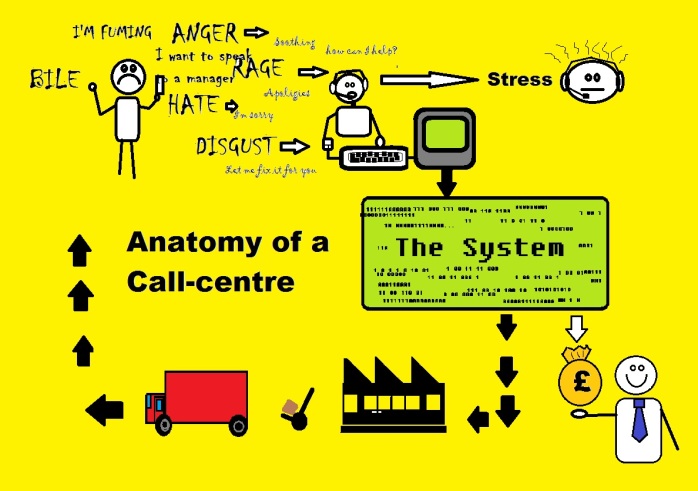It’s not all grim in the call centre. Sometimes it can even be quite funny. Call centre humour can come in a variety of forms; bizarre calls, strange customers, headsets slipping off mid-call or agents falling off chairs. As part of the call centre interviews feature I asked interviewees for their funniest call centre moment. In no particular order here are a few (and if you have your own funny call centre story, please share this in the comments section – it’d be great to hear some more!):
Plane Talk
I had to call my ticketing department, which has agents in 2 different cities, so your call could end up in one of two call centers. One of my coworkers was chatting on his line about books with someone, and asking questions. Then I heard the ticketing agent sitting next to the one I was speaking with answer his question, so I could hear both sides of the conversation at once, happening in 2 different cities.
Anna – Credit control
Person calling to tell us they had just had a big poo.
Call Centre Girl
A lady wanted to know if she broke down whilst transporting sheep in a trailer, if we would recover the livestock if she put them into her car! Had visions of about 10 fluffy white sheep stuffed into a Nissan Micra…….
Lee
Lady naming her pet goat after me after resolving her complaint
Jennifer – TV & Telecoms since 2005
An irate customer called in & my friend took the call. The customer refused to be calmed down & my friend wasnt really able to help. The customer went on a tirade and at one point actually said to my friend she’s going to contact President Obama & get her fired!!! We laughed about that comment for days!
Keith
Far too many to think of at the moment, transferring a dour, confused and agitated Yorkshireman on to a chirpy and wonderfully positive American girl in account security is a recent favourite.
MC
Senior lady who was trying to get an x-rated movie to ‘learn something new for her 50th wedding anniversary’… I instructed her on how to set it up, but she kept failing at it and would call back and hang up until she got me again (this happened like 5 times), then I finally made the movie available for her directly from the system and it turned out she had the TV on, on the EXACT channel with the volume crazy high… I could hear her trying to make sense out of what she was watching, then freaking out, then laughing then talking to herself, then the moaning (from the tv of course) went crazy and she started yelling over the phone asking me to turn it off hahaha the whole thing lasted about a minute, it was like 7 years ago but it still cracks a smile in my face when I remember. She giggled, thanked me and wished me a nice day…
Loz
A colleague standing up, tidying his desk and just generally faffing around with his belongings during a call, then leaning over to peer into a drawer, and his headset falling off. He picked it up, put it back on, and said to the customer: “Sorry, I didn’t hear that – my headset fell off!”
Luisa – Financial services
Having an elderly Welsh gentleman call in and tell me he was playing with his “pride and joy”
JP – Inbound sales
When I was talking about my kitten mittens to a co worker. I alsweres the phone with my verification script inadvertently introducing myself as mittens.
MC –Inbound telecoms
A woman arguing with me until she was blue in the face that nobody in the house had been watching expensive (naughty) pay per views because she had been on holiday for the past 2 weeks. Her tone suddenly changed when I asked if she had teenage boys in the house. All I heard was ‘GAVIIIIN’ then the line went dead. I hope that guy’s ok!
Turgid
Someone who didn’t realise i’d taken them off hold who sang me the entire main verse of relight my fire. Or when most people had gone and I was wheeled around in a post bin very fast.
Dr Bob Winston
Drunk calling, thought he was calling his mate to come and get him as he was stuck in the Pub Toilet. Thought I was messing him about.
Karen – Natwest
Some kids called a few times to report a pigeon in a branch, telling us it’s pooped on the desks.
Anonymous Millie
Saying ‘ yes sir ‘ throughout a call then being told by the caller she was a woman- oops!
Joanne – Airline call centre
when the rep from amex wanted to take a pee break and requested to place the call on hold
Disastra
Caller: I’ve had a letter from you Agent: Yes what does it say?
Caller reads letter exactly as printed (It’s a generic letter we have copies of
Agent: You’ll need to reply in writing as they need a signature.
Caller: But I can’t read or write.
Miss m.e. freedom – inbound energy
Seeing a manger who doesn’t know how to work the systems take a call
Insignificant
A quite heavy advisor, dropped pen and leaned down to pick it up, the chair landed on top of the advisor. Hysterical. A shame and it’s not nice to laugh at, but it was funny
Amy – Utility company
We had a customer call in to report low voltage in her neighborhood. Said she had just gotten home and the lights were dim in her house… she also checked outside and said her neighbor’s lights and the streetlights were also all dim. When our troubleshooters got there they found everything to be fine. The woman had forgotten to take off her sunglasses. Seriously?!
Friendly Pariah – Tech support
At the time it was hellish but we joke about it now saying at least it’s not (that guy) The company started supporting Macs, someone went out and got the most powerful macbook pro they could with a thunderbolt display and every random accessory They then proceeded to call up ten times the first day with how to use questions – we received no training on it (training costs) so we were unsure the second day was 20 calls, getting us to try and change settings so that it behaved more like a pc (it isn’t a pc, it won’t be a pc and no matter how much you scream it will never be) We still get a call a week from him with how to use problems and despite repeated suggestions he has not taken a how to use course
K – Australian bank call centre
I assisted a small-time Aussie “celebrity” apply for credit, and she was declined. Her reaction of ‘Dont you know who I am?’ was pretty priceless!
Ronald – Auto insurance prospecting
My group fantasizing about what it would be like to have an amnesty day where we could, with impunity, speak to the rude customers any way we wished.
Muddy_bum
Setting other workers boot up sound to something very loud. (oh the fun we had..)
JL
Playing “word sneak” on last day. Everyone had to sneak a word past an unsuspecting Inland Revenue customer, guy next to me drew the word “rimjob” and did it.
Eden – TV and internet technical support
Now that I’m a veteran at this place, I mostly take difficult technical calls that come in as a transfer from another agent. My greeting is “Thank you forholding. My name is Eden, Operator ID with Advance Internet Support. How may I assist you?” I must’ve been out of it and tongue this particular day and instead I greeted “Thank you for holding me” – immediate burst of laughter from both me and the agent who was warm transferring. I recovered by reissuing the correct statement and hoping I had made her day.
Karyn
“Hi, this is Karyn, can I have your tracking number beginning with 1Z?”
“Um…. I don’t see that on here…”
“Okay, do you see where it says UPS on it?”
“US…P…S… Yeah I see it. USPS.”
“Ma’am that’s actually the post office.”
“… -click-”
Also had someone call us (UPS) shipping a package through USPS using a FedEx box…






